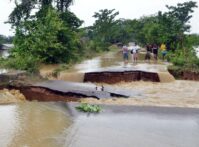
On May 13, 2008, renowned environmental defender
Marina Silva, Brazil’s environment minister, resigned from her post after losing yet another political battle for control of environmental policies within the federal government. The “last straw” was President Luiz Inácio da Silva’s decision to place Minister of Strategic Affairs Roberto Mangabeira Unger, a Harvard law professor with limited experience with Amazon affairs, in charge of the highly publicized Sustainable Amazon Plan (PAS), withdrawing it from the auspices of the Ministry of Environment. Silva’s decision has had major negative repercussions and has exposed the shortcomings of Brazil’s Amazon policy.
The daughter of poor rubber tappers who became a successful politician and a champion of the Amazon, Silva was one of the most recognized and admired members of President Lula’s government. While a member of the Revolutionary Communist Party in the 1980s, she led the Association of Rubber Tree Tappers with Chico Mendes, a pioneer of the Brazilian environmental movement who was murdered in 1988. That same year, Silva was elected to the state legislature of Acre. In 1994, she was elected to the Senate on the Worker’s Party (PT) platform, and was re-elected in 2002. During her eight years in Congress (1995-2002), Silva became a well-respected expert on sustainable development and national environmental protection issues.
Yet during her tenure as Minister of Environment, Silva lost many important battles and was rapidly becoming a merely symbolic figure. Particularly contentious was the alleged obstructionism of Brazilian Institute for Environment and Renewable Resources (IBAMA) technicians, who refused to issue environmental permits for large development projects—especially hydro-electric projects—in the Amazon region. In response, President Lula reduced Silva’s power by splitting IBAMA into two agencies and separating environmental protection from the issuance of environmental licenses. IBAMA personnel reacted with a strike.
Silva’s resignation has already had significant domestic and international ramifications. All second- and third-echelon employees in the Ministry of Environment and IBAMA resigned in solidarity with her. Jose Maria Cardoso da Silva, vice president of Conservation International-South America, called Silva’s departure a “disaster”; Anthony Hall, a development and environment specialist at the London School of Economics, noted that “her resignation will be interpreted as a weakening in the government’s concern with the environment and forest conservation.”
The day after Silva’s resignation, President Lula confirmed that she would be replaced by Carlos Minc, a well-known environmental activist and university professor who was one of the founders of Brazil’s Green Party. Minc previously served as Rio de Janeiro’s state secretary for the environment. His appointment has apparently been well-received: Agência Brasil reports that Silva is “satisfied” with her replacement.
It remains to be seen how Minc will use his new position. His love of the limelight—he follows his own dress code, which does not include a necktie, and has described himself as a “performer”—has cost him politically in his first days on his new job, as President Lula rejected public demands he made to strengthen the Ministry of Environment’s authority. Minc’s first actions as Minister of Environment suggest that he will be a vocal figure. He warned “polluters” that they should fear his ministry’s oversight. He also instigated a public fight with the governor of the state of Mato Grosso, Blairo Maggi, an influential soybean farmer, declaring—a bit sarcastically—that most of the recent increase deforestation in the Amazon has taken place in Mato Grosso. On the issue at hand, however—the issuance of environmental licenses for major development projects in the Amazon—the new minister promised to move faster and more efficiently than his predecessor.
Despite Minc’s aggressive rhetoric, questions about his effectiveness remain. They will be answered by the substance, rather than the style, of his tenure as minister. Back in the Senate, serving the remainder of her term as a representative for Acre until the end of 2010, Silva will continue to be an important voice in the ongoing debate in Brazil over how to reconcile the country’s dual objectives of promoting economic development and protecting the Amazon.
Paulo Sotero is the director of the Brazil Institute at the Woodrow Wilson International Center for Scholars. Brazil Institute Program Assistant Alan Wright contributed to this posting.
 On May 13, 2008, renowned environmental defender Marina Silva, Brazil’s environment minister, resigned from her post after losing yet another political battle for control of environmental policies within the federal government. The “last straw” was President Luiz Inácio da Silva’s decision to place Minister of Strategic Affairs Roberto Mangabeira Unger, a Harvard law professor with limited experience with Amazon affairs, in charge of the highly publicized Sustainable Amazon Plan (PAS), withdrawing it from the auspices of the Ministry of Environment. Silva’s decision has had major negative repercussions and has exposed the shortcomings of Brazil’s Amazon policy.
On May 13, 2008, renowned environmental defender Marina Silva, Brazil’s environment minister, resigned from her post after losing yet another political battle for control of environmental policies within the federal government. The “last straw” was President Luiz Inácio da Silva’s decision to place Minister of Strategic Affairs Roberto Mangabeira Unger, a Harvard law professor with limited experience with Amazon affairs, in charge of the highly publicized Sustainable Amazon Plan (PAS), withdrawing it from the auspices of the Ministry of Environment. Silva’s decision has had major negative repercussions and has exposed the shortcomings of Brazil’s Amazon policy. A Publication of the Stimson Center.
A Publication of the Stimson Center.

 On May 13, 2008, renowned environmental defender
On May 13, 2008, renowned environmental defender 




